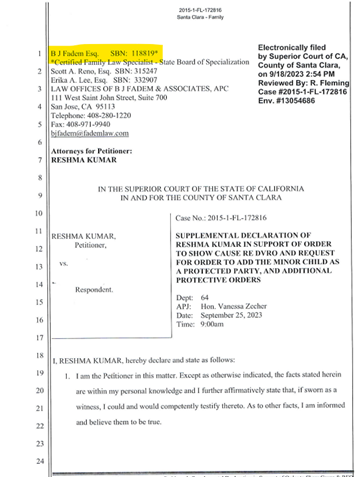

By Fred Johnson, Lois Lane, and Susan Bassi
Attorney Jacquelynn L. Hansen filed a civil harassment restraining order lawsuit against attorney Oleg Volkov in connection with a divorce case where the attorneys represented clients involved in a divorce with related domestic violence claims. Hansen’s lawsuit, and the related appeal, reveal an overall erosion of professional civility and misuse of the courts when it comes to allegations of civil harassment.
Last week, the Second District Court of Appeal issued an unpublished decision reversing orders made by now retired private JAMS judge Christine Byrd that granted protection to Hansen, her receptionist, Anita Collette Darby, and her paralegal, Robin Rousse. Byrd’s order required Oleg Volkov to communicate with Hansen’s office only by US Mail, or email, for purposes of service of legal papers in connection with a divorce case.
In reversing Byrd’s order, the court noted that communications and conduct complained of by Hansen did not meet the legal definition of harassment. The court opined evidence submitted in support of Hansen’s request for protection failed to demonstrate unlawful  violence, a credible threat of violence, or a willful course of conduct directed at Hansen or her staff that would reasonably cause alarm, constitute harassment, or without a legitimate purpose. The court emphasized that communications between highly experienced family law attorneys, even if disfavored or annoying, are protected activity and cannot be the subject to a civil restraining order.
violence, a credible threat of violence, or a willful course of conduct directed at Hansen or her staff that would reasonably cause alarm, constitute harassment, or without a legitimate purpose. The court emphasized that communications between highly experienced family law attorneys, even if disfavored or annoying, are protected activity and cannot be the subject to a civil restraining order.
In issuing their decision, Justices Perluss, Segal, and Martinez sent a stern reminder to the litigant attorneys that while the lawsuit did not meet the legal definition of harassment, the lack of mutual civility displayed by the divorce attorneys was specifically addressed in the recent recommendations of the California Civility Task Force.
The California Civility Task Force (CCTF) is a joint project of the California Judges Association and the California Lawyers Association, in cooperation with the State Bar of California. It is comprised of a diverse group of more than 40 distinguished lawyers and judges. Its initial report, “Beyond the Oath: Recommendations for Improving Civility,” can be found here.
In the Hansen v. Volkov decision, the court noted the Task Force warned that discourtesy, hostility, intemperance, and other unprofessional conduct prolong litigation, making it more expensive for litigants and the court system. A statement that appears to directly relate to the underlying divorce case that gave rise to Hansen’s lawsuit.
In the underlying divorce case, Philip Spencer Wright was represented by Hansen. His wife, Iuliia Platokhina Wright, was represented by Volkov. The couple married on Valentine’s Day 2019 after living together for nearly six months. Only eighteen days after their wedding, Iuliia filed a police report alleging that she had been choked and beaten by her husband.
Iuliia’s allegations led to the Los Angeles District Attorney taking up a criminal prosecution against Philip. That prosecution resulted in a hung jury, or mistrial, ultimately not refiled by the district attorney. Following the criminal prosecution, Iuliia sought a Domestic Violence Restraining Order (DVRO) against her former husband in the family court.
The Wrights’ divorce has led to costly, high-conflict legal proceedings that have continued for four years. Court documents show Philp claimed his former wife’s allegations cost him nearly a million dollars in legal expenses related to the 18-day marriage. Philip’s legal team, handling both criminal and family law matters, included Hansen and controversial attorney, Larry Mark Bakman.
Iuliia initially represented herself in the divorce proceedings as the criminal matter was pending. She became represented by Volkov in the summer of 2019.
Throughout the family and criminal litigation, Iuliia, who is Ukrainian, claimed harassment based on her national origin. She alleged that harassment was a result of her former husband’s legal team. Sources familiar with the proceedings suggest Philip’s legal team benefited from special protections from the court, and district attorney after the team had engaged in conduct that seemingly led to a criminal mistrial. Conduct that included threats of contempt after Philip’s legal team reportedly yelled at the judge in the presence of the jury, without consequence.
After the criminal mistrial, Philp unsuccessfully tried to file DVRO claims against his former wife and her attorney based on their reporting him to police and prosecuting authorities. Complaints that resulted in his criminal prosecution that the family court deemed First Amendment protected activity.
According to court records, and sources familiar with the case, the Wrights’ 18-day marriage resulted in criminal prosecution and years of hostile litigation that included over 70 legal proceedings, a 10-day trial, over 500 filed court documents, and multiple appeals, including the appeal of Judge Christine Byrd’s order granting Hansen’s request for a restraining order against Volkov, which was overturned by the appellate court.
For his representation of the wife in the divorce, Volkov reportedly requested $200,000 in legal fees. However, Philip was reportedly ordered to pay only $20,000, or 10 percent, of the requested amount, despite strong public policy efforts aimed at ensuring a level playing field in family law and domestic violence cases.

Attorney Violence and Harassment Claims Online
Online discussions surrounding threats of violence, harassment, and lack of civility are increasingly including more attorneys. The Davis Vanguard previously reported on the state bar’s investigation of Los Angeles attorney Marla Anne Brown with respect to online comments she made related to protests connected to the death of George Floyd. According to new reports, the state bar recently dismissed those charges.
In a Santa Clara County divorce case, family law attorney BJ Fadem filed a lawsuit requesting a restraining order against the sister of a litigant involved in a divorce case where he had been appointed to represent the minor children.
The children’s aunt, and others, had been critical of Fadem on Twitter in connection with Fadem’s court appointments as minors counsel.
As previously reported by the Vanguard, appointment of minors counsel has been highly controversial in family law cases. Fadem’s use of the courts to deflect this criticism has been viewed by parents familiar with these cases as an effort to chill speech critical of Fadem, a quasi-public figure.
As a court appointed minors counsel, Fadem is afforded immunity similar to that afford to public court judges. As a result, “Fadem should have much thicker skin when it comes to speech critical of him online”, a local attorney noted, while requesting to remain off record.
Similar to the conduct of the attorneys in the Wright divorce, BJ Fadem appears to be misusing the courts in a manner designed to draw out litigation and increase expense that benefits him personally exactly as the CCFT seeks to deter.
In another case before Judge Zecher, BJ Fadem recently filed documents in support of expanding a restraining order to include a minor child at the center of the case. Fadem’s request was made based on a single online message sent by a third party. The message referenced “Daya,” the first name of a father in the divorce who had reportedly been denied care, custody and control of his child during a nearly eight-year divorce proceeding that had not yet been finalized.
The online message stated:
“YOU NEED TO allow Daya to be a father to his daughter. Why are you doing this to your daughter???
Fadem’s client, Reshma Kumar, claimed that the message and use of “all caps,” caused her to be fearful for her own safety and the safety of her young daughter and as a result was seeking to add her daughter to the restraining order filed against the father.
The Davis Vanguard is committed to expanding its reporting on family court issues. Please subscribe and donate to support this important reporting.


In an era where the legal profession continues to evolve, Bar Associations should recognize the importance of ensuring not only the competence but also the physical and mental fitness of attorneys. To maintain the highest standards of professionalism, integrity, and client representation, I believe it is crucial for Bar Associations to consider the implementation of qualifications related to physical fitness for duty and psychological testing for attorneys.
Physical fitness for duty assessments can help identify any health issues or impairments that may affect an attorney’s ability to effectively represent their clients. By ensuring that attorneys are physically fit to perform their duties, we can enhance the quality of legal services and safeguard the well-being of clients.
Additionally, psychological testing can serve as a valuable tool to assess an attorney’s mental fitness and emotional well-being. The legal profession is often associated with high levels of stress, demanding workloads, and ethical dilemmas. Evaluating an attorney’s psychological health can help identify potential issues early on, allowing for appropriate support and intervention when necessary. This not only benefits the attorney but also helps maintain the ethical standards and integrity of the legal profession.
Bar Associations considering the implementation of such qualifications should do so with sensitivity, respect for individual privacy, and in compliance with applicable laws and regulations. The aim is not to stigmatize or discriminate but to ensure that attorneys are in the best possible condition to serve their clients effectively and ethically.
I believe that the inclusion of physical fitness for duty and psychological testing as part of the attorney qualification process can contribute to a more resilient and accountable legal profession. It can help uphold the principles of justice and fairness while safeguarding the interests of both attorneys and their clients